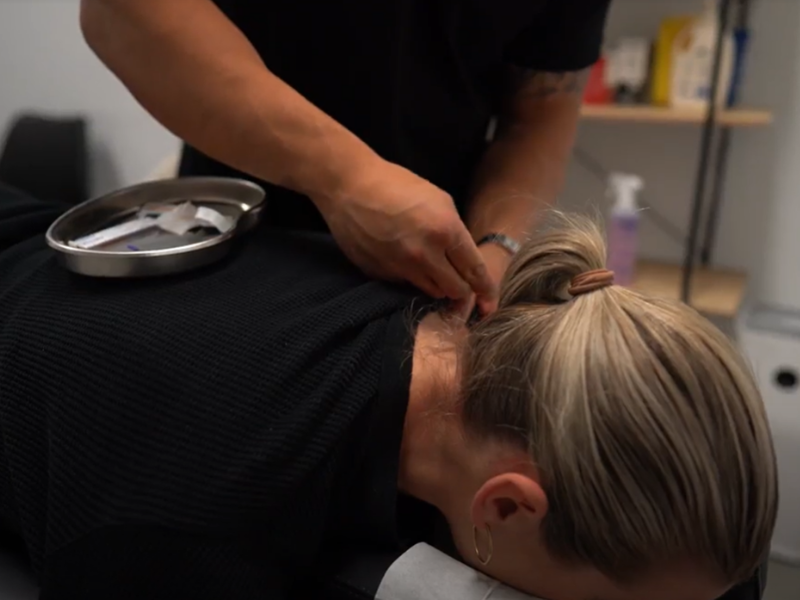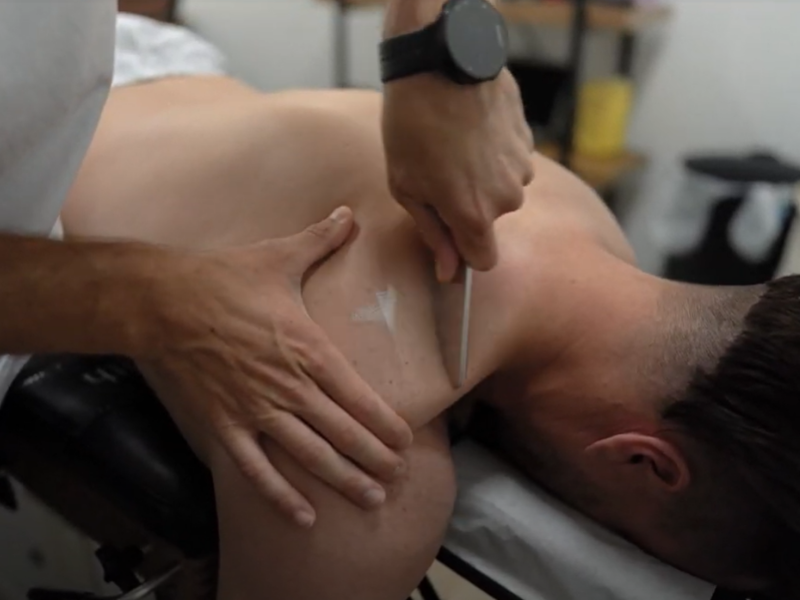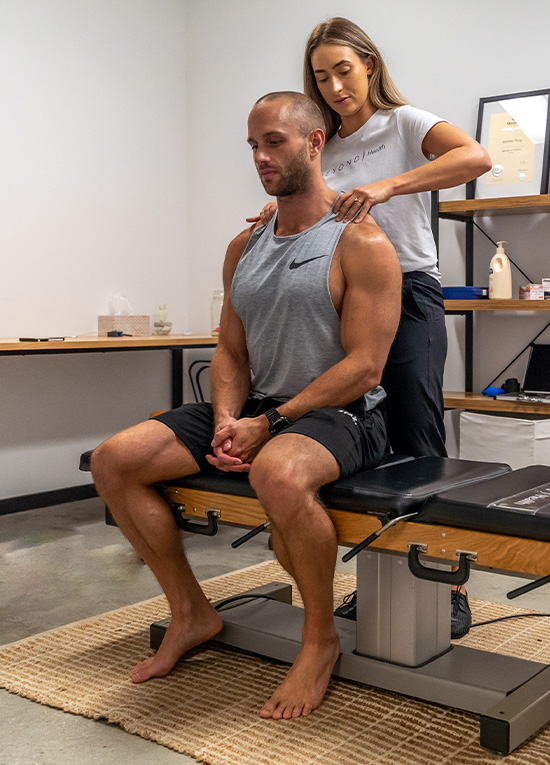
26 Mar Putting The Freeze On Frozen Shoulder
Adhesive Capsulitis, more commonly known as ‘frozen shoulder’ is pain and stiffness in your shoulder region for an extended period, sometimes months, often years. Adhesive capsulitis can be described as a dull or aching pain felt in your shoulder joint, usually located over the outer shoulder area and sometimes the upper arm, it usually only presents in one shoulder rather than both. Mobility in the shoulder joint may be restricted, impacting your ability to reach overhead, to the side, across your chest, or rotate your arm completely from front to back.
Frozen shoulder occurs as a result of a range of issues, such as a shoulder injury like a rotator cuff tear, bone fracture, shoulder surgery, or even after brain and heart surgery. The most prevalent cause is the restricted movement of the shoulder joint due to recovering from an injury such as a broken arm.

What is Frozen Shoulder?
The shoulder is composed of three bones that connect together and form a ball and socket joint. Your humerus (upper arm), scapular (shoulder blade), and clavicle (collar bone), all work together to help your shoulder move easily. The head of your humerus fits into a shallow socket within your shoulder blade and the shoulder capsule, which is a strong connective tissue, surrounds this joint as well as the rotator cuff tendons. Frozen shoulder occurs when the shoulder joint capsule thickens, stiffens, and contracts. When this happens, adhesions (thick bands of tissue) form within the joint causing severe pain and prohibiting some movement of the shoulder.
Frozen shoulder progresses in three stages:
The first stage is referred to as “Freezing”. In this stage, the pain and stiffness begins to slowly increase and your shoulder movement and range of motion decrease. This stage typically lasts anywhere between 6 weeks and 9 months.
The next stage is referred to as “frozen”. In this stage, although your pain in the affected shoulder might decrease, there is little to no range of movement in the shoulder of the affected arm. This shoulder condition lasts for about 4 to 6 months, during this time normal daily activities will become very difficult to execute without adequate care and physical therapy.
The third and final stage is “thawing”. During this period of about 6 months to 2 years, shoulder motion and range of movement slowly improve to near normal strength and significant pain also subsides.

Frozen Shoulder Symptoms
Some symptoms to look out for if you think you might have adhesive capsulitis are:
- Decreased range of motion
- Joint stiffness
- Dull, achy pain in the shoulder
- Shoulder pain that worsens at night
- Shoulder instability

Who is at Risk?
This condition predominantly affects people from ages 40 – 60, with the most likely people to acquire this injury being females. Chronic illnesses such as diabetes also increase the risk of frozen shoulder, with research showing that 10 – 20% of people with diabetes developing this condition. Other risk factors of adhesive capsulitis are:
- Immobilisation: People who have suffered an injury or have undergone surgery that requires their arm to be immobilised for a prolonged period are at risk of developing frozen shoulder.
- Thyroid Disorders: Individuals with thyroid disorders are more prone to developing frozen shoulder.
- Cardiac Conditions: Heart or lung conditions that affect breathing patterns can increase the likelihood of developing adhesive capsulitis.
- Autoimmune Disorders: Individuals who have autoimmune disorders, such as rheumatoid arthritis, are at greater risk.
- Previous Shoulder Injury: People who have had a previous shoulder injury or surgery may be more predisposed to developing frozen shoulder.
- Stress: Individuals who experience high levels of stress may be more susceptible to developing frozen shoulder.

Diagnosis & Treatment
The diagnosis of a frozen shoulder may require a physical examination by a healthcare provider like a registered chiropractor. The healthcare provider may assess the range of motion in the affected shoulder through physical examinations, stretches and may also take an X-ray or MRI scan to rule out other conditions that could be causing the symptoms. It is important to seek medical attention if you are experiencing symptoms of frozen shoulder, such as pain and limited mobility, as early intervention can facilitate faster recovery.
Common treatment options for frozen shoulder include:
- Pain relief – Painkillers can reduce pain and inflammation caused by frozen shoulder.
- Physical therapy – Physical therapy involves stretching exercises and mobilisation techniques to help loosen the shoulder joint capsule.
- Corticosteroid/cortisone injection – Corticosteroids can be injected into the shoulder joint to reduce inflammation.
- Hydrodilatation – Hydrodilatation is a steroid injection with sterile water that goes into the shoulder joint to help stretch and loosen the joint.
- Surgery – If other treatments are unsuccessful, seeing an orthopaedic surgeon may be an option to release the tight tissues surrounding the shoulder joint.
It is important to consult with a doctor or physical therapist to determine the best course of treatment for an individual’s specific case of frozen shoulder.

How to Prevent Frozen Shoulder
- Regular exercise: Performing regular shoulder exercises that involve moving the arms in all directions can help to prevent the occurrence of frozen shoulder.
- Proper posture: Maintaining proper posture while sitting and standing can prevent the tightening of shoulder muscles and reduce the risk of frozen shoulder.
- Avoiding shoulder injuries: To prevent the inflammation of the shoulder joints, it is important to avoid injuries like a shoulder dislocation and or rotator cuff team. It is important to work, play and perform in a safe way to minimise falling on the shoulder or putting unnecessary strain on your shoulders.
- Using proper lifting techniques: Lifting heavy objects using the proper technique can help to prevent shoulder injuries and reduce the risk of frozen shoulder.
- Maintaining a healthy diet: Consuming a healthy diet rich in vitamins and minerals can help to maintain the strength and flexibility of the shoulder muscles.
- Managing stress: Stress can cause tension in the shoulder muscles, which can lead to frozen shoulder. Managing stress through relaxation techniques such as yoga or meditation can help to prevent this.

Putting The Freeze On Frozen Shoulder
Frozen shoulder is something you want to avoid, but in reality, it may not be that easy. The best way to reduce the impact frozen shoulder has on your life is to adopt a proactive approach – maintain a healthy and active routine, and a healthy diet and get early diagnosis and treatment of the condition.
Coming in for treatment for your shoulder pain has never been easier, whether you call up to make an appointment or simply book online, you will always be in good hands at Beyond Health Chiropractic. Whilst recovering from Frozen shoulder, the focus of your treatment will be to restore your range of movement and control your pain safely. We will walk you through a range of physical therapy consisting of stretches and exercises to get you on your way to feeling your best. Our experienced chiropractors will sit down with you and discuss your plan for treatment going forward and take the time to tailor their approach to your specific situation.







No Comments